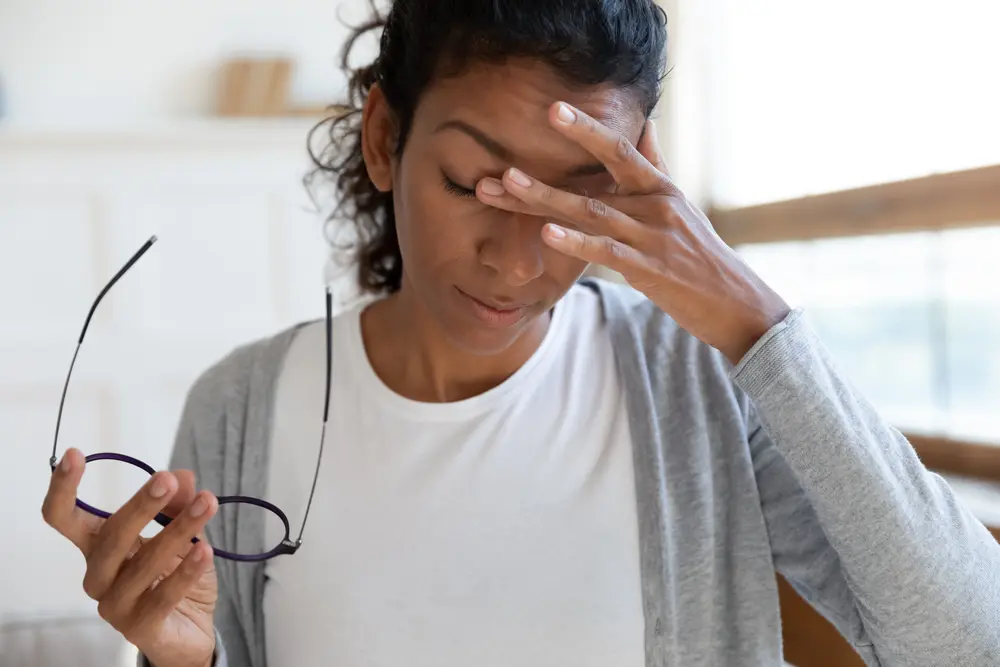The bleary-eyed feeling of waking up often comes with an unwelcome discovery: a crusty buildup in the corners of your eyes. While not exactly aesthetically pleasing, this phenomenon, known medically as rheum, is a normal part of your eye’s self-cleaning process. Let’s explore why this crust forms and what it means for your overall eye health.
The Night Shift: Tears and Blinks Keep Your Eyes Clean
Our eyes are constantly bombarded by environmental challenges. Dust, pollen, and even microscopic debris can irritate the delicate ocular surface. To combat this, our body employs a clever two-part system:
-
Tear Production: Lacrimal glands, located near the top of your eye socket, produce tears. Tears are a complex mixture of water, oil, and enzymes that perform several crucial tasks:
- Washing away irritants from the eye’s surface
- Lubricating the eye for smooth movement
- Fighting off bacteria to maintain eye health
-
The Power of Blinking: Blinking is more than just a reflex to keep dust out. With each blink, your eyelids spread the tear film across the eye’s surface, effectively sweeping away debris and irritants. This continuous cleaning action ensures healthy, clear vision throughout the day.
Sleep Disrupts the Cleaning Cycle
While this cleaning process runs continuously throughout the day, it faces a hurdle during sleep. Since we don’t blink as frequently while sleeping (or not at all during deep sleep stages), tears can’t wash away debris as efficiently. This allows tears, mucus, dead skin cells, and other debris to accumulate in the corners of your eyes. As the night progresses, this mixture dries out, forming the crust you see upon waking.
Crusty Eyes: Normal or Not?
While a little morning eye crust is a normal occurrence, there are situations where it might indicate an underlying issue:
- Excessive Crust: If the crust is thick, yellow, or green and you experience significant amounts daily, it could be a sign of an eye infection, such as conjunctivitis.
- Redness and Itching: If your eyes are red, itchy, and accompanied by heavy crusting, allergies might be the culprit.
- Uneven Crusting: If the crusting is only present in one eye or appears significantly more in one eye compared to the other, consult a doctor to rule out any underlying conditions.
Keeping Your Peepers Clean: Eyelid Hygiene Tips
Here are some tips to maintain good eye hygiene and minimize morning crust:
- Gentle Eyelid Cleaning: Using a warm compress with a diluted baby shampoo solution, gently massage your eyelids to loosen any crust. Rinse thoroughly with clean water. This can help remove any debris that might have accumulated overnight.
- Avoid Rubbing: Rubbing your eyes can irritate them and worsen any existing condition. The friction can also cause the delicate blood vessels in the eye to burst, leading to redness.
- Wash Your Face Regularly: Washing your face before bed removes dust, makeup, and allergens that might contribute to eye irritation and crusting. A clean face reduces the amount of debris your eyes need to fight off during sleep.
- Consider Artificial Tears: If you experience dry eyes, artificial tears can help keep your eyes lubricated and minimize crust formation. Artificial tears mimic the natural tear composition, providing much-needed moisture to the eye’s surface.
When to See a Doctor
If you experience any of the following alongside eye crust, it’s best to consult an ophthalmologist (eye doctor):
- Persistent redness or itching of the eyes
- Pain or discomfort in the eye
- Increased sensitivity to light
- Blurry vision
- Uneven crusting in one eye
- Crust that is difficult to remove
Conclusion
Morning eye crust is a normal occurrence, a result of our body’s natural cleaning process during sleep. However, excessive crusting, accompanied by other symptoms, might indicate an underlying issue. By maintaining good eye hygiene and being aware of potential concerns, you can ensure healthy, clear eyes and wake up feeling refreshed, not crusty. Remember, even though a little morning gunk is nothing to worry about if you have any concerns, it’s always best to consult an eye doctor for personalized advice.
This story was created using AI technology.
















